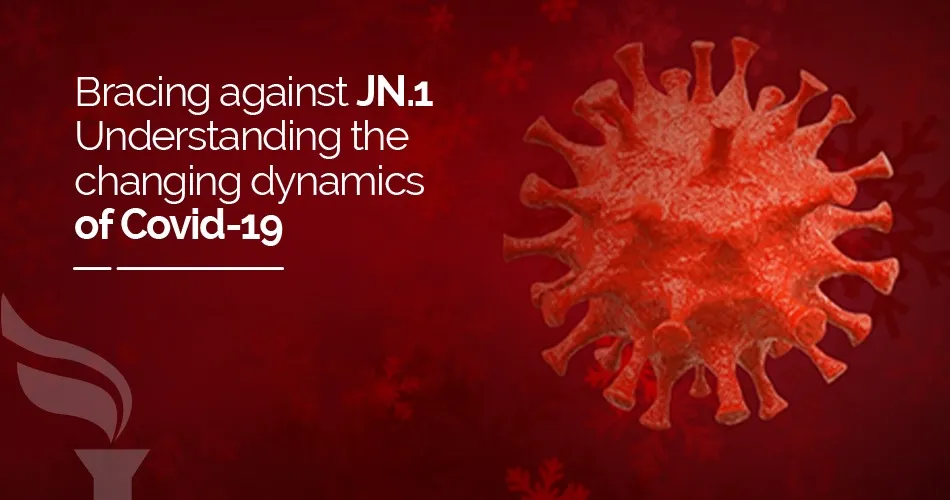Unravelling the JN.1 Variant: A detailed analysis at the Latest Covid-19 Strain
Jan 30, 2024

The ever-evolving nature of the SARS-CoV-2 virus continues to pose challenges in the battle against the COVID-19 pandemic. Among the myriad variants that have emerged, the JN.1 variant has recently garnered attention from the scientific community and health authorities. In this blog post, we will delve into the key characteristics of the JN.1 variant and explore its implications for public health.
Understanding JN.1
The JN.1 variant, like its predecessors, is a mutated form of the SARS-CoV-2 virus responsible for COVID-19. Named after the genomic lineage designation, JN.1 has distinct genetic changes that set it apart from the original strain. Scientists closely monitor these variants to assess their transmissibility, severity, and potential impact on vaccine efficacy.
Genetic Mutations:
One of the defining features of the JN.1 variant is its specific set of genetic mutations. These mutations can influence the virus's behaviour, including its ability to spread more easily or evade immune responses. Researchers are actively studying these changes to determine the variant's potential impact on disease dynamics.
Transmissibility:
Preliminary data suggests that the JN.1 variant may exhibit increased transmissibility compared to earlier strains. This heightened transmissibility could contribute to more rapid and widespread transmission within communities. Public health measures, such as vaccination campaigns and enhanced surveillance, become crucial in curbing the variant's spread.
Vaccine Efficacy:
Concerns often arise about the effectiveness of existing vaccines against newly identified variants. Researchers are diligently evaluating the JN.1 variant's response to current vaccines to ensure that preventive measures remain effective. Booster shots and vaccine updates may be considered to address any potential challenges posed by the evolving virus.
vaccines to ensure that preventive measures remain effective. Booster shots and vaccine updates may be considered to address any potential challenges posed by the evolving virus.
Signs and Symptoms of JN.1
The symptoms of the JN.1 variant are similar to those of the original COVID-19 virus. Common signs include:
- Fever
- Cough
- Shortness of breath
- Fatigue
- Body aches
- Loss of taste or smell
How to prevent the spread of the JN.1 Variant?
Preventing the spread of the JN.1 variant, like any other strain of the SARS-CoV-2 virus, involves a combination of individual actions, public health measures, and vaccination efforts. Here are some key preventive measures:
1) Take vaccination
Stay up-to-date with COVID-19 vaccinations, including booster shots if recommended.
Follow public health guidelines regarding vaccination eligibility and schedules.
Adhere to Public Health Guidelines:
2) Stay informed about guidelines from local health authorities
Practice good hygiene, including regular hand washing and the use of hand sanitizers.
Wear masks in crowded or high-risk settings, as recommended by health authorities.
Social Distancing:
3) Maintain social distance
Avoid crowded places and gatherings, especially in enclosed spaces.
Testing and Early Detection:
4) Stay Informed and Get Tested
Get tested for COVID-19 regularly, especially if you experience symptoms or have been in close contact with someone who tested positive.
Early detection helps in isolating individuals and preventing further transmission..
Conclusion:
The JN.1 variant, like other variants of concern, highlights the dynamic nature of the SARS-CoV-2 virus. Ongoing research and surveillance efforts are crucial for staying ahead of the virus and adapting strategies to mitigate its impact. As the scientific community continues to unravel the intricacies of JN.1, health sectors collaboration and global research remain key aspects in navigating the complexities of the ongoing COVID-19 pandemic
If you feel any symptoms of the JN-1 variant then feel free to reach out to Apollo Diagnostics. We are always there to provide the best analysis of your health.
Related Blog Post
- A guide to sleep better during the COVID-19 pandemic - Apollo Diagnostics
- Time is up For Corona - Keep your Health Pristine, Get the Vaccine!
- Testing for COVID-19? Here’s something you should know
- Got vaccinated? Here’s what you should know.
- Home care tips to fight COVID-19
- How effective is the vaccine against Omicron? Should I get the booster shot? Visit our blog to know the importance of getting fully vaccinated.
Blog Categories
- Child Health
- Mens Health
- Women's Health
- Mental Health
- Health Myths & Facts
- Fitness
- Nutrition/Recipes
- Remedies
- Weight Management
- Stress Management
- Health Supplements
- Addiction Management
- Disease Management
- Allergy
- Anemia
- Arthritis
- Asthma
- Autoimmune Diseases
- Blood Pressure
- Cancer
- Deficiencies
- Dengue/Malaria/Chikungunya
- Diabetes
- Eye Problems
- Heart Diseases
- Hepatitis
- HIV/AIDS/STD
- Hormonal Imbalance
- Infection/Flu/Viral
- Kidney
- Liver
- Menstrual Problems
- Pregnancy
- Skin & Hair Problems
- Stomach Ailments
- Thyroid
- Others
- Health Checkups
- Diagnostics/Pathology
- Lifestyle & Wellness
- Covid
- Medical Tests
- Cholesterol
- Health Tips
- Parent Care/Old Age
- Lungs
- Food Intolerance








